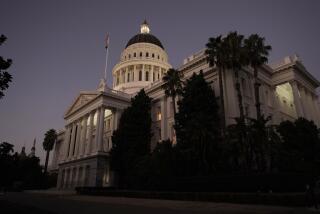Measure Seeks to Help Disarm Ex-Convicts
- Share via
SACRAMENTO — As Atty. Gen. Bill Lockyer sees it, if a bill now before Gov. Gray Davis had been the law, white supremacist Buford Furrow might have been prevented from killing a postal worker and wounding five people at a San Fernando Valley Jewish community center in 1999.
If the bill had been the law, Lockyer reasons, former Los Angeles Police Officer Angela Marie Shepard might still be free instead of locked in jail and facing a murder charge in the Aug. 26 shooting of a former USC basketball player.
In the cases of Furrow and Shepard--and in countless other examples each year in California--the subjects had no legal right to possess a handgun. They had been convicted of earlier crimes, and under California law, were forbidden from ever possessing a gun again.
Shepard allegedly shot former basketball standout Audrey Gomez during an argument. Furrow is serving five life terms for the murder of Filipino American letter carrier Joseph Ileto and the wounding of three children, a counselor and a receptionist at the Jewish center in Granada Hills.
Lockyer, who sponsored the bill, SB 950, by Senate Republican Leader Jim Brulte of Rancho Cucamonga, complained that law enforcement authorities have no way of knowing in advance whether a suspected criminal may have purchased a handgun legally, been convicted of a crime later but kept the gun anyhow.
The bill would enable police on the street to tap into a proposed electronic database at the state Department of Justice. The information would disclose if the suspect was currently wanted for a crime or had a criminal history and no longer had the legal right to carry a gun.
Lockyer said that would give officers an extra measure of safety, “so when they respond to a 911 call late at night that indicates there is a domestic fight going on, they will know if there were prior convictions and there might be illegal weapons in the household.” Now, there is no system for police to quickly find such information about gun ownership.
He noted that California long has prohibited gun ownership by mentally ill people and individuals convicted of felonies and certain misdemeanors, including domestic violence. But he said actual seizure of their guns has not been fully enforced.
“This bill would not be necessary if efforts were successful to [have authorities] acquire the weapon at the time there is a criminal conviction. Yet that often doesn’t happen,” Lockyer said. “Why? You’ll have to ask judges that question.”
The relatively unnoticed bill passed last month on unanimous votes in both houses. It was one of those rare proposals that enjoyed support from such disparate organizations as the National Rifle Assn., Handgun Control Inc., Peace Officers Research Assn., Sportsmen’s Lobby and county sheriffs and district attorneys.
The bill would take effect next July 1 and cost about $4 million a year, a sum that has some supporters of the program fearing that Davis may reject it because of increasingly pressure to reduce state spending in the face of a deteriorating economy.
Hoping to Survive State ‘Budget Squeeze’
Law enforcement officials said they had received no commitment from the governor’s office that he will sign the bill.
Randy Perry, who represents the rank-and-file Peace Officers Research Assn., often an ally of Davis, said he had received no word from Davis’ staff on whether he intends to sign or veto the bill.
Noting that Davis had promised to slash spending bills because of the worsening economy, Perry added, “Sure, we’re concerned.”
A spokesman for Davis, who has until midnight Oct. 14 to sign bills sent to him during the final days of the legislative session, said the governor had not yet taken a position.
Lockyer agreed there will be a “budget squeeze” next year, but said he was hopeful Davis would sign the bill and include funds to operate the program in next year’s budget. “I don’t see any reason that he shouldn’t sign it,” Lockyer said.
He noted that the NRA and the California Rifle and Pistol Assn., which also worked for the bill’s passage, frequently criticize government for enacting new gun controls while failing to properly enforce gun laws already on the books.
This bill meets that demand, he said. “It’s supported by everybody on both sides of the gun-safety debates,” he said.
Brulte noted that Davis has insisted that education and public safety were his highest priorities. “I don’t think you could have a higher priority than preventing crime,” Brulte said.
Furrow, a white supremacist who suffered from mental illnesses, legally purchased a .45-caliber semiautomatic pistol in 1992 and the next year bought a .357 magnum revolver. Three months before the San Fernando Valley shootings, he was convicted of a felony assault.
Shepard, 37, joined the LAPD in 1989 and purchased a .38-caliber revolver in 1990. She pleaded no contest in 1995 to making terrorist threats against fellow officer Michelle Loomis, including threatening to kill her. She was fired from the force that year and most recently had worked at a residential shelter in Los Angeles, where she supervised co-worker Gomez.
More to Read
Sign up for Essential California
The most important California stories and recommendations in your inbox every morning.
You may occasionally receive promotional content from the Los Angeles Times.













